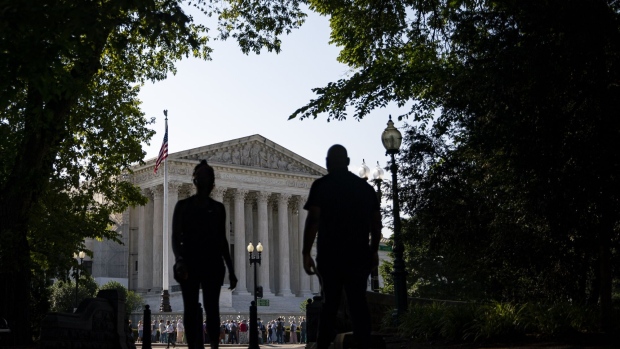Jan 16, 2024
Supreme Court Fishing Case May Hobble Agency Power on Climate to Crypto
, Bloomberg News

(Bloomberg) -- The US Supreme Court’s biggest opportunity yet in its drive to curb federal regulators comes as the justices weigh a major legal shift that would crimp agency power over workplace conditions, drug safety and emerging issues such as climate change and cryptocurrency.
The justices on Wednesday hear two appeals that aim to reduce the regulatory leeway when Congress hasn’t given clear directives. The appeals ask the court to toss out a decades-old legal doctrine that often requires judges to defer to agencies about the scope of their authority, a step that could throw longstanding regulations into doubt.
The implications could be especially profound for efforts to regulate new industries and issues at a time when partisan polarization has stymied congressional lawmaking. Any decision to limit court deference would “hamstring agencies across the country,” touching well-established industries including nuclear power, airlines, banking and health care, said Temple University law professor Craig Green.
“The idea of deference is a fundamental mechanism for all of the agencies to do their jobs,” Green said during a discussion organized by the Center for American Progress and Democracy Forward. “Agencies have more expertise, they are more specialized and they are more flexible – so they can address new problems and crises that inevitably arise over time that Congress can’t foresee.”
The potential consequences are sweeping enough that they have galvanized liberal activists who plan to rally outside the Supreme Court before the arguments Wednesday.
At issue is a legal principle known as the Chevron doctrine, which for 40 years has given federal agencies latitude when they implement unclear mandates from Congress. Under Chevron, if a law is ambiguous, courts should defer to a “reasonable” agency interpretation of the statute.
The doctrine, championed by conservatives when it was established in 1984 but now vilified by them, has become a pillar of administrative law, cited in more than 15,000 court cases.
Philip Hamburger, founder of the conservative New Civil Liberties Union, said the Supreme Court should sweep away a fundamentally flawed doctrine that unfairly tilts legal proceedings. Chevron compels “a systematic favoring of the most powerful party” in regulatory disputes – the very agencies that wrote the rules – said Hamburger, whose group represents fishing industry clients in one of the high court cases.
The two near-identical clashes involve a National Marine Fisheries Service requirement that some herring boats cover the cost of government-approved observers aboard their vessels. Fishing companies based in New England and New Jersey are challenging the estimated $710 daily fee, though it isn’t in effect.
Read More: Fishing Fee Fight at Supreme Court Backed by Big Government Foes
The challengers say that while federal law lets the Fisheries Service require monitors, Congress didn’t authorize the agency to demand boat owners pay the cost.
In each case, a federal appeals court invoked Chevron and said the payment requirement was based on a reasonable interpretation of the 1976 Magnuson-Stevens Act, a law that governs the management of marine fisheries in federal waters. The Biden administration is defending the requirement and urging the court to leave the Chevron doctrine intact.
The Supreme Court’s conservative majority has shown deep skepticism toward what it views as agency overreach. In a 2022 case involving efforts to stifle greenhouse gas emissions from power plants, a sharply divided court said regulators must have clear congressional authorization before acting on “major questions.” That ruling undercut the practical force of the Chevron doctrine but didn’t overturn it altogether.
A ruling tossing out Chevron would task judges to referee minor questions, too – including arcane, deeply technical matters that Congress hasn’t fleshed out but are the provenance of experts and specialists in government, said James Goodwin, a senior policy analyst at the Center for Progressive Reform.
“Agencies don’t just do the big things – they do lots of small things – and that’s where Chevron is important,” Goodwin said. “It’s the things agencies do to keep the trains running all the time but that involve a lot of technical expertise.”
The issue looms large for financial regulators who may look to oversee cryptocurrency and artificial intelligence – but are relying on decades-old statutes that predate both technologies. It’s also a concern for environmental regulation – with federal agencies increasingly leaning on landmark statutes such as the clean air and clean water acts that were established in the 1960s and 70s to address new chemicals, combat fresh pollution threats and respond to shifting scientific knowledge.
Business advocates say courts have applied Chevron so expansively agencies now make sweeping policy decisions that should be left to Congress – and can shift with each new presidential administration.
“Businesses cannot effectively plan for the future when agencies are free to unilaterally change the basic rules at any time,” the US Chamber of Commerce argued in court papers.
Partisan gridlock means Congress is passing fewer laws – and even when it does, leaving many blanks for federal agencies to fill in. For instance, Treasury Department officials are dictating the specifics of which companies will qualify for hundreds of billions of dollars in tax credits created or expanded by the 2022 Inflation Reduction Act.
A full-throated decision overturning Chevron would have a “tectonic” effect, rendering reams of longstanding regulations legally vulnerable, said Cary Coglianese, director of the Penn Program on Regulation at the University of Pennsylvania’s law school.
But the fishing companies have also suggested a narrower approach, saying the court can strike down the fee without directly overturning Chevron. And even a ruling tossing out the doctrine wouldn’t have to call into question past regulations.
“If they overturn it prospectively only, that’s a different story, and of course there’s a lot of middle ground they could take as well,” Coglianese said. “It may be that this does not have a dramatic effect on what agencies do.”
(Updates with rally plan in fifth paragraph.)
©2024 Bloomberg L.P.





